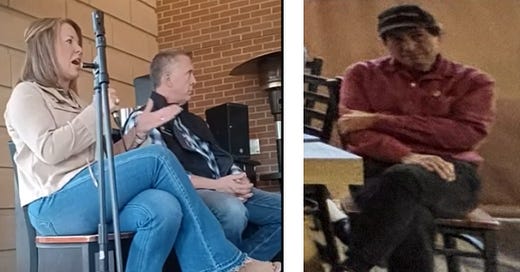Last night, I attended the town hall meeting that Colorado Representative Brandi Bradley held in collaboration with Max Brooks, who represents a neighboring district.
Rep. Bradley and I have a connection. Last year (two years before as well) we competed against one another in the general election for House District 39. In the concession message that I sent the morning following the election, I shared with her that many times in conversations over the course of the campaign I had “brought up that [her] legislative record includes bipartisan achievements or corrected others who have said otherwise.” The concluding paragraph reads as follows:
Relatedly, I have also mentioned from time to time in my campaign that I am co-chair of the Colorado Southern Front Range Alliance, which is a Douglas County-based chapter of the national Braver Angels organization. We are dedicated to "Bringing Americans together to bridge the partisan divide and strengthen our democratic republic." As I have done before, I anticipate that in the coming year I will reach out to you to participate in one or more of our activities. I would be glad were you to accept such an invitation.
Both of these topics – Rep. Bradley’s record of bipartisanship and her potential participation in Braver Angels activities, such as a series of workshops and debates we will hold in Colorado Springs this summer – came up during the chat that she and I had afterward.
As I also stated in my concession message, “Disagreement that public servants may have about some issues does not preclude productive cooperation on others.” I am happy to add that Rep. Bradley last night and before has suggested that she and I cooperate on an issue of common concern (water scarcity). I am confident that we will.
Just as disagreement does not preclude productive cooperation, the prospect of productive cooperation does not necessitate that one conceal frank disagreement. This brings me to another element of last night’s event – HB25-1312: Legal Protections for Transgender Individuals. After brief opening remarks from the two legislators, the town hall moved on to questions that audience members had submitted on index cards. As background to the question that I submitted, consider a video that Rep. Bradley posted on Facebook on May 15. Eleven seconds in, after alluding to the bill having undergone amendment by the state senate, she said the following:
Section 6 is where we’re having the problem. There’s still the “policy must be inclusive of all reasons that a student might adopt a name that differs from the student’s legal name.” That is new bill language. It means that a child can go to school and change their name from the student’s legal name. That’s still dividing parents from children. We still have a really big problem with that.
Section 6 of HB25-1312 requires that if a school “chooses to enact or enforce a policy related to names, that policy must be inclusive of all reasons that a student might adopt a name that differs from the student’s legal name.”
Here is the question that I submitted last night:
Representative Bradley, in a video you posted on Facebook, you spoke against the provision of House Bill 1312 that requires schools to honor the decision of children to change their names. You said this “is dividing parents from children.” If a parent supports the child’s decision and wants to protect the child against hurtful practices, doesn’t this law support that parent’s parental rights?
And below is Rep. Bradley’s reply (one can view the entire exchange here).
I think I know who asked that question. Parental rights to me is informed consent. And so if you’ve followed me and my bills to protect children against puberty blockers, the problem with medicalizing our children is that the parents aren’t given the informed consent about the sterility and medicalizing children. So for me, that’s not giving the parents…and you’ve heard me talk about a lot of times the parents’ are not given that actual acknowledgement of what is happening to their children. The difference here is that you’re asking teachers and other students to lie to the child and go against their belief system, and that is not right or fair for my children or anyone else. My children aren’t gonna call a little girl a boy’s name. That is against what I believe in, my worldview, and it’s simply not gonna happen.
Over the last two years, Rep. Bradley’s worldview and my own have come into contention many times (see for instance here, here, here, here, and here). I do not begrudge anyone their individual values. I agree with Rep. Bradley that it is proper for the government to refrain from intruding on them. In this particular case, we disagree on whether what the law requires constitutes such an intrusion.
To require that teachers and other students honor a child’s request to be called by what is culturally a typical boy’s name does not infringe in the slightest on their right to view the child as actually a girl. They can believe whatever they like. Nothing is being required of them beyond that they extend simple courtesy and kindness to a child whose worldview is different from their own.
Within the House District 39 community, opinions are sharply divided on matters such as this one. While I would like more members of our community to view things as I do, it is alright if they don’t. The most important thing is that we resolve our differences with grace and generosity of spirit.






Thanks to you for your noble efforts re: bridging the vast crevasses in culture war dialogue.
You have the patience to take on these contrivances created by local individuals and groups belonging to dark-money astroturfs.
In many ways, your best service to our community is bringing light to difficult ideology.